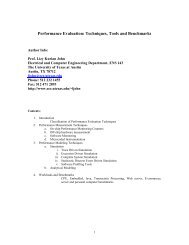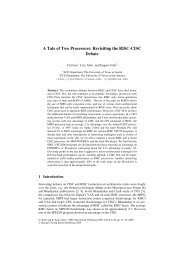Copyright by William Lloyd Bircher 2010 - The Laboratory for ...
Copyright by William Lloyd Bircher 2010 - The Laboratory for ...
Copyright by William Lloyd Bircher 2010 - The Laboratory for ...
You also want an ePaper? Increase the reach of your titles
YUMPU automatically turns print PDFs into web optimized ePapers that Google loves.
Chapter 8 Related Research<br />
This section summarizes related research in the areas relating to predictive processor<br />
power management. Specifically, per<strong>for</strong>mance counter-driven power models, system-<br />
level power characterization and predictive power management are covered.<br />
8.1 Per<strong>for</strong>mance Counter-Driven Power Models<br />
Contemporary research in the area of per<strong>for</strong>mance counter-driven power modeling has<br />
focused primarily on the single largest consumer, the processor [LiJo03] [Be00] [IsMa03]<br />
[CoMa05] [BrTiMa00]. System-level power modeling [HeCe06] is mostly focused on<br />
power consumption within a single subsystem [Ja01] [ZeSo03] [KiSu06] [GuSi02].<br />
Consistent throughout processor power modeling is the theme that power consumption is<br />
primarily determined <strong>by</strong> the number of instructions retired per cycle. Li et al [LiJo03]<br />
present a simple linear model <strong>for</strong> power consumption <strong>by</strong> operating system services. <strong>The</strong><br />
resultant models are a function of only IPC. <strong>The</strong>ir modeling only considers operating<br />
system routines and requires a separate model <strong>for</strong> each operating system routine. Most<br />
importantly, their model is simulation-based and consequently does not correlate well<br />
with power consumption of actual processors. In contrast, the models in this dissertation<br />
is based on direct, in-system measurement and shows that power depends more on<br />
fetched µop/cycle rather than IPC. Bellosa [Be00] uses synthetic workloads to<br />
147




